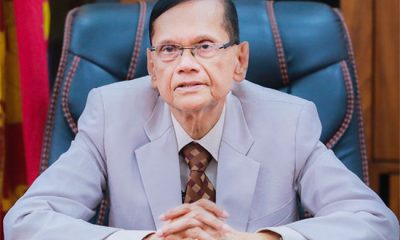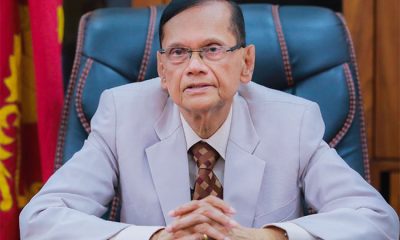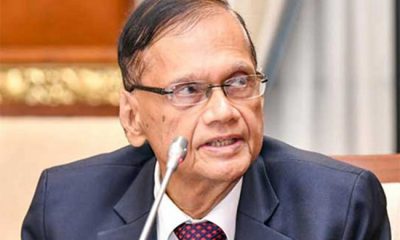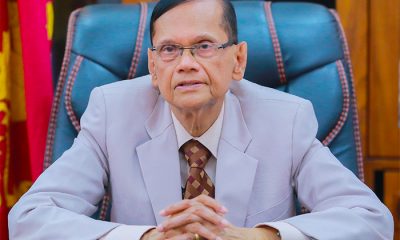News
Prez would not have taken on judiciary without SLPP’s backing – GL

By Shamindra Ferdinando
Top Nidahas Janatha Sandhanaya spokesman Prof. G. L. Peiris yesterday (13) alleged that President Ranil Wickremesinghe would not have taken on the judiciary without the backing from the ruling SLPP.
The former External Affairs Minister said so when the media sought his response to former President Mahinda Rajapaksa declaring the SLPP’s readiness to face local government polls at any time. The SLPP Chairman made the declaration at a public rally held in Moneragala over the weekend.
Prof. Peiris said that though the SLPP declared so, it worked closely with President Wickremesinghe to undermine the electoral process. The academic said that the UNP leader with just one MP in parliament couldn’t have pursued the high profile project without the SLPP’s support.
The rebel SLPP National List MP said that if the SLPP was genuinely ready to face the electorate, the party should ask the President to release funds required by the Election Commission.
Regardless of whatever the President and the SLPP say, the government parliamentary group both in and outside parliament challenged the Supreme Court directive, Prof. Peiris said.
Referring to a statement issued by the Bar Association of Sri Lanka (BASL) in respect of declarations made by Premanath Dolawatte, MP, and State Finance Minister Shehan Semasinghe as regards the Supreme Court intervention, Prof. Peiris alleged that the government was trying to overwhelm the judiciary. The ex-minister strongly criticised the move to summon members of the judiciary before the House Privileges Committee.
Prof. Peiris said that both the UNP and the SLPP knew they would face heavy defeat at Local Government polls. They realised in the wake of such devastating loss, the government couldn’t prevent public movement for a national level election.
The ex-minister said that the current parliament didn’t reflect political environment in the country. Therefore a general election was needed to pave the way for a Parliament that would earn public respect. Instead of seeking a way out of the crisis, the government was trying to pit the legislature against the judiciary in line with Wickremesinghe-Rajapaksa strategy.
Prof. Peiris said that as Speaker Mahinda Yapa Abeywardena was overseas, an Opposition delegation led by SJB and Opposition leader Sajith Premadasa took up issues at hand with Deputy Speaker Ajith Rajapakse. Strongly condemning indiscriminate violence unleashed on protesting University students recently, Prof. Peiris alleged that Wickremesinghe-Rajapaksa strategy was threatening the very basis of the Constitution.
Those at the helm of political power should realise that at the end of the day they couldn’t ignore the Supreme Court directive, Prof. Peiris said.
In spite of internal strife, the SLPP parliamentary group which consists of 120 MPs is the largest party in parliament and facilitated Wickremesinghe’s strategy, the ex-minister said. The President couldn’t last 24 hours without the SLPP’s backing, he declared.
News
LG polls: PM accused of violating election laws, EC urged to act

As the Election Commission (EC) finalised arrangements for the conduct of the Local Government polls today (06), election watchdog PAFFREL has accused Prime Minister Dr. Harini Amarasuriya of having urged NPP supporters to campaign during the silent period.
PAFFREL Executive Director Rohana Hettiarachchi in a letter, dated May 5, 2025, addressed to EC Chairman R.M.A. L. Rathnayake, complained that Premier Amarasuriya told a public rally at Thelawala, Moratuwa, to campaign during the pre-election silence period, which came into effect at midnight on 03 May.
Hettiarachchci has alleged that such advice issued by the Premier undermines efforts being made to bring about a new political culture.
The Premier made the controversial statement at the NPP’s final rally. She was leading the campaign in the absence of President Anura Kumara Dissanayake, who is on a state visit to Vietnam.
Polling will commence at 7 am in 13,759 polling stations countrywide. Members are to be elected for 339 Local Government bodies.
According to EC, altogether 75,589 candidates from 49 recognised political parties and 257 independent groups are in the fray. The EC placed the number of eligible voters at 17,156,338.
Police headquarters said that police would be deployed countrywide to ensure an incident-free election.
The last LG poll was held in February 2018.
News
New Pope by Sunday?

The College of Cardinals will gather beneath Michelangelo’s frescoed ceiling at the Sistine Chapel on Wednesday, tasked with the solemn duty of choosing a successor to Pope Francis, who passed away a fortnight ago. While papal conclaves can stretch over days, recent history suggests the white smoke may rise swiftly – possibly before the bells ring across Colombo for the Sunday mass.
The last two conclaves – in 2005 and 2013 – which elected Pope Benedict XVI and Pope Francis, respectively, wrapped up within 48 hours. In fact, none of the past 10 conclaves have lasted more than five days, a telling precedent that hints at a brisk decision this time as well.
Speculation, as always, is running wild. Names of prominent Cardinals have been floated, their odds debated in hushed corners of seminaries and newsrooms alike. Yet, papal history teaches us caution: As the popular saying goes. ‘he who enters the conclave as Pope, exits a Cardinal’.
Consider Cardinal Giuseppe Siri, the Archbishop of Genoa. In 1958, at just 52, he was the leading contender to succeed Pius XII. Yet, the College of Cardinals swayed toward the elderly Angelo Roncalli, who emerged as Pope John XXIII. Siri’s papal hopes would flicker again in 1963 and in both 1978 conclaves – only to be extinguished each time.
Before the voting begins, the Cardinals will reflect on the Church’s present needs. And when the white smoke spirals into the sky and the words ‘Habemus Papam’ echo around St. Peter’s square, it may be a familiar figure or a complete outsider who steps onto that balcony. Such was the case in October 1978, when a little known Polish cardinal Karol Wojtyła, became John Paul II. Or in 2013, when the retired Jesuit Archbishop from Buenos Aires was called back into service as Pope Francis.
Francis was a reformer. He shunned opulence for humility, promoted mercy over judgment and stirred theological waters by welcoming divorcees to communion and expanding roles for women in the Vatican. When a reporter asked him for a comment on women’s wider role at Vatican, the Pope said tongue in cheek, ‘they are certainly managing the finances better than men.’
Of the 135 Cardinals eligible to vote this week, 108 were appointed by Francis himself, hailing from 71 nations – a testament to his global vision. Many are first-time voters, but not Sri Lanka’s Malcolm Cardinal Ranjith, who took part in the 2013 conclave that elected Francis with an overwhelming majority.
Given the Francis-heavy composition of the electors, it’s tempting to predict a like-minded successor – someone who’ll carry the torch of reform. But should the College of Cardinals feel the need for a bridge-builder between traditionalists and progressives, a seasoned elder could be chosen for a short, stabilising papacy. And we may well know his name before Sunday.
by Rex Clementine
News
Prez urged to withdraw Personal Data Protection Act (A) Bill, consult relevant stakeholders

A group of non-governmental organisations and their linked individuals have urged President Anura Kumara Dissanayakaye to withdraw the Personal Data Protection Act (amendment) Bill (Data Protection Act No 09 of 2022) that was gazetted in March 2025. They have requested President Dissanayake to consult relevant stakeholders and experts on key amendments to be made.
The following is the text of the letter dated May 5, 2025 addressed to President Dissanayake: We write to you in your capacity as the Minister of Digital Economy regarding the proposed amendment to the Personal Data Protection Act, No. 9 of 2022, which was placed on the gazette on 27 March 2025.
It is noteworthy that Sri Lanka is leading by example in South Asia as the first country to enact digital privacy legislation for the protection of its citizens. However, we would like to bring to your attention that the enactment of the Personal Data Protection Act (PDPA) in 2022 was met with criticism by media associations, civil society and members of the opposition, including members of your own party, due to its inability to fulfil the stated aim of safeguarding digital privacy. Regrettably, the proposed amendments to the PDPA do not rectify the concerns raised in 2022.
A crucial shortcoming of the Act is the power of the President to appoint members to lead the Data Protection Authority (DPA). The appointment process is not independent and hence does not guarantee that the DPA will function without political interference by successive governments. In this context, there is risk of the DPA being deliberately under-resourced or the staff lacking subject-domain expertise, which will adversely impact its ability to conduct investigations, develop robust guidelines, handle complaints efficiently, or effectively supervise complex data processing activities, especially when related to AI.
With the mandate to oversee the implementation of the Act, the DPA can carry out executive, administrative and quasi-judicial functions, including conducting investigations, issuing instructions to data controllers/processors and citizens for compliance and imposing hefty fines for non-compliance. With such a broad range of functions, it is imperative that the governing body is appointed with the approval of the Constitutional Council and does not function at the whim of the government in power.
There is a staggering power imbalance between data controllers and citizens, as citizens are unaware of how their data will be used or stored or how to access remedies when data controllers violate their rights under the Act. For instance, there is no mention of whether legal representation is required, timelines for the conclusion of investigations etc. For the Act to achieve the stated aims, the remedies need to be accessible, meaningful and timely.
The vague and broad terms contained in the Act will result in arbitrary and inconsistent application. The Act does not provide clear, enforceable mechanisms for data breach notifications or for assessing risks to individuals’ privacy. Additionally, exemptions contained in the Act allow restriction of citizens’ right to data privacy for purposes such as national security and public safety. The ambit of “public safety” and “national security” are to be determined by a DPA that is not-independent. In such contexts, as historically demonstrated in Sri Lanka, minority groups and marginalised communities have been impacted the most by the arbitrary application of broad and vague laws.
International standards recommend the inclusion of a “journalistic exemption” in data privacy laws, whereby journalists and media organisations are allowed to store/process the private information of individuals, such as political figures, for the purposes of accurate reporting and informing the public. The lack of a “journalistic exemption” in the PDPA can hamper free and fair reporting as journalists carry the risk of being sanctioned under the Act. Additionally, the concern extends to other activities conducted in the public interest, such as research in social sciences or health, investigations by civil society organisations. Even certain forms of artistic expression might involve processing personal data where strict adherence to consent or purpose limitation principles could be challenging or counterproductive to the public good. The Act’s general but not generous exemptions might not adequately or clearly cover these specific contexts, potentially creating chilling effects beyond traditional journalism.
The proposed amendments fail to address these concerns and have not answered the calls for independent oversight to protect digital privacy. The purpose of the Act may be to protect the rights of citizens but the broad mandate of the DPA will likely not allow the full realisation of rights under the Act without adequate enforcement mechanisms.
With the advent of artificial intelligence and advances in technology, citizens are defenceless in the face of an onslaught upon their right to choose how their private data is used and stored by state entities and private corporations. In this context, we urge the government to consider the guiding principles for States proposed by the UN Special Rapporteur on the Right to Privacy when enacting data privacy laws 2022 (attached): legality, consent, transparency, purpose, fairness, proportionality, minimization, quality, responsibility and security.
We request the government not to hurriedly pass amendments to bring an inadequate law into force. Instead, the government should conduct meaningful consultations with stakeholders and international experts to ensure that the proposed amendments address the concerns that have been raised and comply with international standards.
We request the following steps to be taken:
1. Withdraw the Personal Data Protection Act (amendment) Bill that was placed on the gazette in March 2025.
2. Consult relevant stakeholders and experts on key amendments to be made.
3. Ensure the appointment process for the Board of Directors of the DPA is independent and involves the Constitutional Council.
4. Ensure the proposed amendments are in line with international human rights standards and best practices for digital privacy.
5. Commission a capacity assessment to affirm the readiness of public institutions to comply with the requirements of the Act, and the time and resources required to be fully compliant.
a. Release the results of the assessment to the public.
6. Conduct programmes to raise awareness of the public on the rights and remedies available under the Act to strengthen their ability to hold data controllers to account.
CC: 1. Harshana Nanayakkara, Minister of Justice
2. Eng. Eranga Weeraratne, Deputy Minister of Digital Economy
3. Mr. Waruna Sri Dhanapala, Acting Secretary for the Ministry of Digital Economy
Signatories: Adayaalam Centre for Policy Research,Aham Human Resource Centre,
Alliance for Minorities,Anuradhapura District Citizens Committee,Asia Lanka Social Development Cooperation,Association of War Affected Women,Centre for Society and Religion,Eastern Social Development Foundation,Environment and Community Development Information Centre,Families of the Disappeared,Human Elevation Organisation,Human Rights Law Chambers,Institute of Social Development,International Centre for Ethnic Studies,Jaffna Social Action Centre,Law and Society Trust,Mannar Social and Economic Development Organization,Mannar Women’s Development Federation,Movement for Plantation Peoples’ Land Rights,National Fisheries Solidarity Movement,National Peace Council,RED Organisation,Right to Life,Samadana,Shramabhimani Kendraya,Social Institute for Development of Plantation Sector,Tamil Civil Society Forum,Transparency International Sri Lanka,Uva Shakthi Foundation,Viluthu,Women’s Action Network,Women and Media Collective,Young Journalists Association,Anushani Alagarajah,Visaka Dharmadasa,Sarala Emmanuel,
Brito Fernando,Ruki Fernando,Mario Gomez,Sakuntala Kadirgamar,Herman Kumara,
Jayanthi Kuru-Utumpala,Kandumani Lavakusarasa,Maathumai Paranthaman,Denver Mark Peterson,Maithreyi Rajasingham,Kumudini Samuel,Ambika Satkunanathan,Shreen Saroor,Pathujan Srinagaruban,Sandun Thudugala
-

 Sports6 days ago
Sports6 days agoOTRFU Beach Tag Rugby Carnival on 24th May at Port City Colombo
-

 News4 days ago
News4 days agoRanil’s Chief Security Officer transferred to KKS
-

 Opinion2 days ago
Opinion2 days agoRemembering Dr. Samuel Mathew: A Heart that Healed Countless Lives
-

 Features5 days ago
Features5 days agoThe Broken Promise of the Lankan Cinema: Asoka & Swarna’s Thrilling-Melodrama – Part IV
-

 Features6 days ago
Features6 days agoTrump tariffs and their effect on world trade and economy with particular
-

 News5 days ago
News5 days agoRadisson Blu Hotel, Galadari Colombo appoints Marko Janssen as General Manager
-

 Business4 days ago
Business4 days agoCCPI in April 2025 signals a further easing of deflationary conditions
-

 Features5 days ago
Features5 days agoA piece of home at Sri Lankan Musical Night in Dubai




















